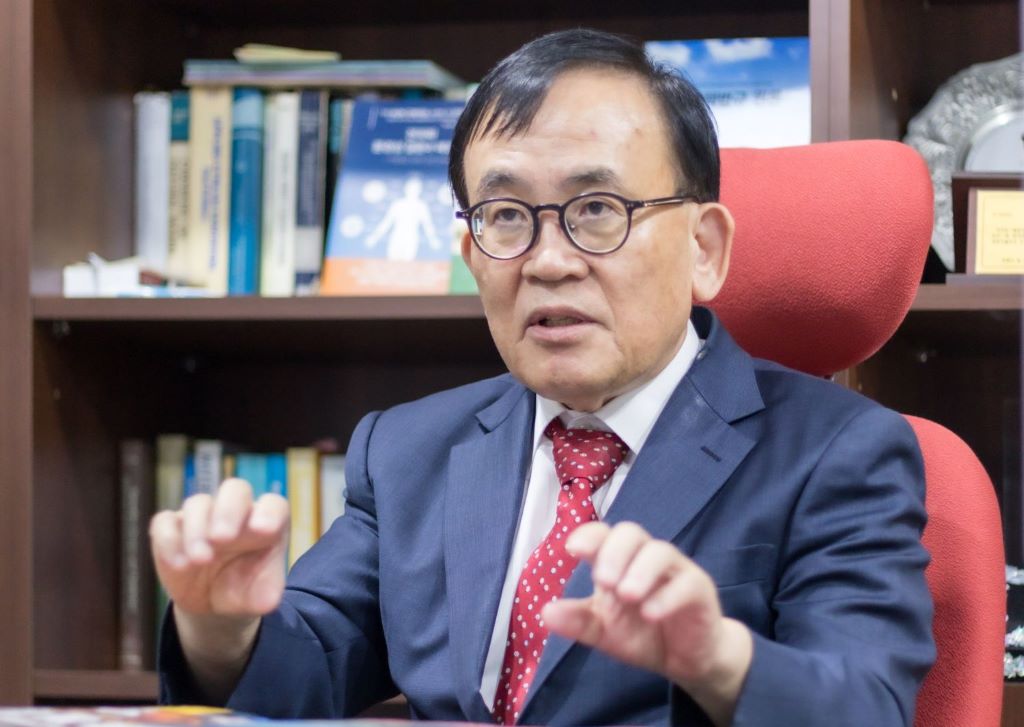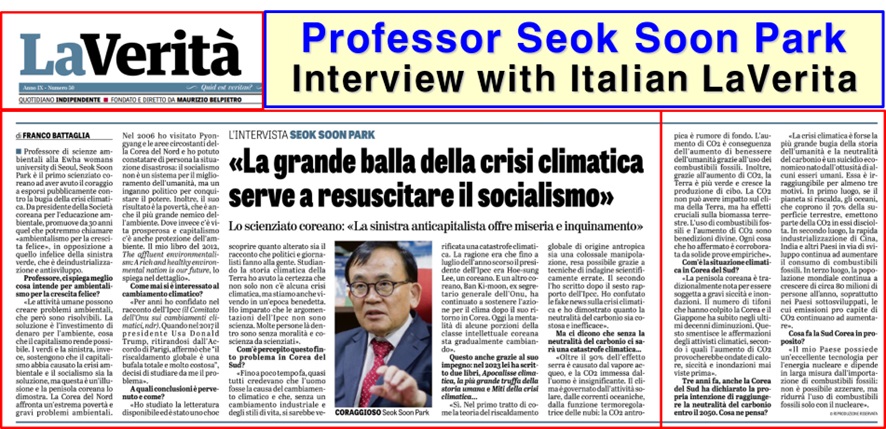TRANSLATION OF INTERVIEW WITH SEOK SOON PARK IN LA VERITA ON FEBRUARY 20, interview by Franco Battaglia

Seok Soon Park
A professor of environmental science at “Ewha Womans University” in Seoul, Seok Soon Park is the first Korean scientist to have had the courage – because it takes courage – to publicly expose himself against the lie of the climate crisis. With an American doctorate in environmental science from Rutgers University, he returned to South Korea in 1988 to found the Department of Environmental Science and Engineering at his current university. As the president of the Korean Society for Environmental Education, for 30 years he has been promoting affluent environmentalism, or what we might call “environmentalism for happy growth”, as opposed to the Green Left’s deindustrialization and anti-development, i.e., an unhappy degrowth.
Professor Park, can you tell us what affluent environmentalism is?
“Human activities can create environmental problems, that are solvable, though. The solution is to invest money for the environment, something that capitalism makes possible. The Greens and the left, on the other hand, claim that capitalism would cause an environmental crisis and socialism would be the solution, but this is an illusion and the Korean peninsula proves it. North Korea faces extreme poverty and serious environmental problems. In 2006, I visited Pyongyang and the surrounding areas of North Korea and witnessed firsthand the disastrous situation: socialism is not a system for the betterment of humanity, but only a political deception to gain power. Moreover, the final result of socialism is poverty, and it also becomes the greatest enemy of the environment. Instead, where there is prosperous life and capitalism there is also environmental protection. My 2012 book “The Affluent Environmentalism: A rich and healthy environmental nation is our future” explains this philosophy of happy growth in detail.”
How did you become interested in climate change?
“As an environmental scientist, I have dealt with other issues, not climate. Indeed, for years I had trusted that the climate issue was in the terms told by the Ipcc. When in 2017 U.S. President Donald Trump announced his withdrawal from the Paris Agreement, stating that ‘global warming is a total and very expensive hoax,’ I decided to study the issue for myself.”
What conclusions did you come to and how?
“I studied the available literature and it was a shock to me to discover how distorted it is being told to people by politicians and journalists. By studying Earth’s climate history, I became aware that not only there is no climate crisis, but also that we are living in a blessed age. I learned that the arguments of the Ipcc are not science, and if I have to be honest, I think there are many people at the Ipcc without the morality or conscience of scientists.”
How is this issue perceived in South Korea?
“Until recently, almost everyone in Korean society believed that humans were the cause of climate change and that if industrial civilization and human lifestyles continued as now, a climate catastrophe would occur. The reason for this belief was that until July of the last year the chairman of the Ipcc was Hoe-sung Lee, a Korean, and another Korean – Ki-moon Ban, former secretary-general of the United Nations – continued to support climate action after his return to Korea. Today the mindset of some portions of the Korean intellectual class is gradually changing.”

This is also thanks to your efforts: in 2023 you wrote two books, “Climate Apocalypse, the Greatest Hoax in Human History” and “Myths of the Climate Crisis”…
“Yes. In the first book I discuss how the theory of anthropogenic global warming is a colossal manipulation, made possible by scientifically flawed investigative techniques. I also analyze the scientific contradictions of carbon neutrality, and the economic damage and environmental disadvantages in striving for it. I wrote the second book after the publication, exactly one year ago, of the Sixth Ipcc Report, when the world’s media began to alarm by fearing the end of the planet. In my book I refuted the fake news about the climate crisis, in particular I showed how carbon neutrality is expensive and ineffective.”
But we are told that without carbon neutrality there will be a climate catastrophe….
“Ninety-five percent of the greenhouse effect is caused by water vapor, and the man-made CO2 input is insignificant. Climate is governed by solar activity, ocean currents, the thermoregulatory function of clouds: anthropogenic CO2 is background noise. The increase in CO2 is a consequence of humanity’s increased prosperity from the use of fossil fuels. In addition, due to increased CO2, the Earth is greener and food production is increasing. CO2 cannot impact Earth’s climate and has beneficial effects on Earth’s biomass. The use of fossil fuels, the growth of human population and the increase of CO2 are divine blessings. I have lived all my life as a scientist, and scientists speak on the basis of established theories and reproducible empirical evidence to support their claims: everything I have said is backed up by solid empirical evidence.”
What is the climate situation like in South Korea?
“The Korean peninsula is traditionally known to be subject to severe droughts and floods. In 1442, Grand King Sejong of the Chosun Dynasty personally led the invention of the rain gauge, and the “Annals of the Chosun Dynasty” record weather anomalies such as hail, frost and snow, even in summer, in the years 1400-1800, thus confirming that the Little Ice Age was a global phenomenon. From 1876 to 1905, the country suffered thirty years of severe drought, and in 1925 a major flood caused damage that was quantified as 58% of a one-yar national budget. The heat index in Seoul in the 1930-40s was higher than it is today, despite the fact that CO2 levels did not exceed 300 ppm (today we are over 400 ppm). The number of typhoons that have hit Korea and Japan has declined in recent decades. All of the above belies the claims of climate activists that rising CO2 is causing unprecedented heat waves, droughts and floods.”
South Korea also declared (it was 2020) its intention to achieve carbon neutrality by 2050. What are your thoughts on carbon neutrality and what do you think is desirable for a nation to do about it?
“The climate crisis is perhaps the biggest lie in human history, and carbon neutrality is economic suicide born of the obtuseness of some human beings. It is unattainable for at least three reasons. First, if the planet warms, the oceans, which cover 70% of the Earth’s surface, will emit some of the CO2 dissolved in them. Second, the rapid industrialization of China, India and other developing countries continues to increase the consumption of fossil fuels. Third, the world population continues to grow by about 80 million people a year, especially in underdeveloped countries, whose per capita CO2 emissions continue to increase.”
What is South Korea doing about this?
“My country has excellent nuclear power technology and is heavily dependent on importing fossil fuels: net zero is impossible; however, it will reduce the use of fossil fuels only with nuclear power”.
